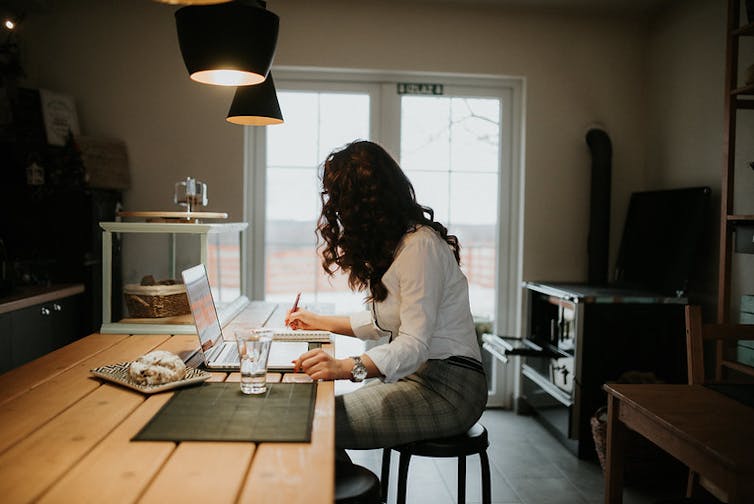Can't sleep and feeling anxious about coronavirus? You're not alone
- Written by Olivia Fisher, Research Fellow (Health Services Research) Faculty of Health, School of Public Health and Social Work, Queensland University of Technology
This is a confusing and, frankly, scary time for a lot of us. There’s so much contradictory information, and the “right” thing to do yesterday is now the “wrong” thing to do today.
If you’re feeling edgy, having trouble sitting still or concentrating, finding yourself constantly or obsessively checking for updates, losing sleep, or waking in the early hours of the morning feeling anxious – you’re not alone.
These are completely normal, human reactions to a completely abnormal situation. Worrying about whether you’re doing enough to protect yourself and others, whether you’re going to lose income, and what this will all mean long-term is to be expected.
Read more: Coronavirus is stressful. Here are some ways to cope with the anxiety
You might be wondering whether this worry and other feelings of anxiety might indicate a developing mental health problem.
Feeling this way for a few days, or even weeks, in the context of a major national emergency, does not indicate that you have a mental disorder.
But some people will need to access support or talk to their GP about ongoing concerns.
What’s normal?
Normal fear responses are part of a healthy, adaptive process that allows us to get away from or deal with something we perceive as dangerous.
- is situation specific – related to a particular event of circumstance
- is limited in time
- does not have a long-term impact on your ability to go about your day-to-day life (although there may be short periods where it can feel overwhelming).
However, sometimes our fear can become overwhelming and start to impact on our ability to function in our daily lives.
Some anxiety symptoms to be aware of are excessive worry which is difficult to control, restlessness, feeling easily fatigued, having difficulty concentrating, irritability, muscle tension or sleep disturbance.
 Sometimes fear can impact on your ability to function.
lauren rushing/Flickr, CC BY-NC-ND
Sometimes fear can impact on your ability to function.
lauren rushing/Flickr, CC BY-NC-ND
Coping mechanisms while social distancing
In times of trouble, Australians usually band together to support each other with hugs, a helping hand and a nice hot cuppa. We raise money, have benefit concerts, and get to work so we can feel we’re doing something. We build belonging in our community, and feel a sense of accomplishment when we pull through together.
This time it’s different, and our normal ways of coping with disasters are not going to work. For many of us, social distancing means we are not able to use most of our day to day coping strategies either, such as going to the gym or hanging out with friends.
Read more: Why are we calling it 'social distancing'? Right now, we need social connections more than ever
But there are things we can do to buffer against the impact of uncertain and traumatic times.
Having a strong sense of belonging, along with a regular sense of accomplishment, are key to our mental well-being. They’re linked with lower levels of depression and anxiety symptoms, and higher levels of mental well-being.
Belonging
Social distancing does not require social isolation. There are safe ways to connect with people that don’t involve putting yourself at risk of COVID-19 exposure.
Staying connected is not just a nice thing to do – it’s actually important for our health. Some theorists have suggested that belonging is a fundamental human motivation, just as compelling as the need for food.
Don’t wait for people to connect with you – reach out to them. There’s a good chance that they’re feeling isolated and afraid as well.
Read more: Social distancing can make you lonely. Here's how to stay connected when you're in lockdown
Accomplishment
It’s important to find ways in your day to day life to feel a regular sense of accomplishment, and it might be a matter of re-framing what you consider to be an accomplishment.
If you have kids in the background, dogs barking to be taken for a walk, and all the other wonderful interruptions that may come with working from home, it’s likely that just reading and responding to emails is an accomplishment in itself.
 Even simple tasks can be seen as accomplishments.
Nenad Stojkovic/Flickr, CC BY
Even simple tasks can be seen as accomplishments.
Nenad Stojkovic/Flickr, CC BY
If you’re not working at the moment and funds are tight think about what else you can accomplish. Spring clean. Plant capsicum, strawberry or tomato seeds saved from your lunch and see if they will grow. Or learn something new, like robotics, knitting or crochet.
Read more: 6 strategies to juggle work and young kids at home: it's about flexibility and boundaries
When to get help?
Sometimes what you’re experiencing will signal a more serious problem that needs some external support.
It’s time to seek help if:
- symptoms of anxiety are starting to affect your ability to function in your daily life
- the symptoms are getting worse
- the symptoms feel overwhelming, or
- the symptoms persist over time – more days than not.
Supports are available where and when you need them. The Lifeline phone line is open 24 hours on 13 11 14.
Beyondblue has online information and resources such as the beyondblue web chat.
For children, teens and young adults, KidsHelpline has supports available by phone at 1800 55 1800, web chat or email.
Your GP can help you to identify whether your symptoms meet the criteria for an anxiety disorder. They can also write a mental health care plan, if appropriate, and refer you to professional services in your local community.
Authors: Olivia Fisher, Research Fellow (Health Services Research) Faculty of Health, School of Public Health and Social Work, Queensland University of Technology
Read more https://theconversation.com/cant-sleep-and-feeling-anxious-about-coronavirus-youre-not-alone-134407



















